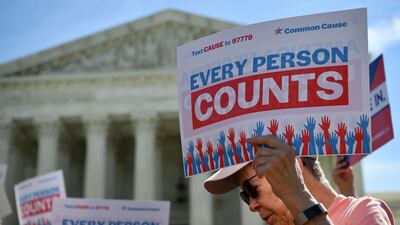President Donald Trump's administration went before the Supreme Court on Monday to defend its plan to exclude undocumented immigrants living in the US from being counted in the national census.
The census data is critical in determining how many seats each state receives in the House of Representatives.
The court's conservative majority, which includes three Trump appointments, indicated that ruling on the matter could be premature.
That was because of the administration's admission that it did not know how or if it would be able to implement the proposal due to the difficulty in identifying undocumented immigrants.
The administration requested an expedited hearing, asking for a decision by early January, when Mr Trump is required by law to send census numbers to Congress.
The Census Bureau is supposed to send final data to him by December 31, but acting solicitor general Jeffrey Wall said census officials were "not currently on pace" to meet the deadline.
A delay of even three weeks would mean the bureau would be sending numbers to president-elect Joe Biden, who takes office on January 20.
Mr Trump is the first president to try to remove millions of non-citizens from the once-a-decade head count of the US population, which determines congressional seats and the allocation of some federal funding.
He outlined his intention in a July memo.
The case is the latest, and probably the last, in Supreme Court battles that the Trump administration has faced in response to hardline immigration policies.
The court, meeting by telephone because of the coronavirus pandemic, heard arguments in its second case in two years related to the 2020 census and immigrants.
The challengers to Mr Trump's proposal include states led by New York, cities, counties and immigrant rights groups.
They have argued that his move could leave several million people uncounted and cause California, Texas and New Jersey to lose House seats.
The challengers say Mr Trump's plan would dilute the political influence of states with larger numbers of illegal immigrants, including heavily Democratic California, by undercounting their true populations and depriving them of House seats.
There are an estimated 11 million immigrants living in the US illegally.
Until now, the government's practice was to count all people regardless of their citizenship or immigration status.
The US Constitution requires the apportioning of House seats to be based on the "whole number of persons in each state."
Mr Wall told the justices that it is "very unlikely" the administration would have the required data to exclude all illegal immigrants.
Instead, it may propose excluding certain groups, such as those in federal detention, and the total number may not be high enough to affect seat numbers, he said.
The challengers say Mr Trump's policy breaches the Constitution and the Census Act, a federal law that outlines how the count is conducted.
Mr Trump's lawyers said in court papers that he acted within his authority and that the challengers lacked the necessary legal standing to bring a case.
But Conservative Justice Samuel Alito said that for the administration to exclude all of the illegal immigrants living in the US from the population count "seems to me a monumental task".

